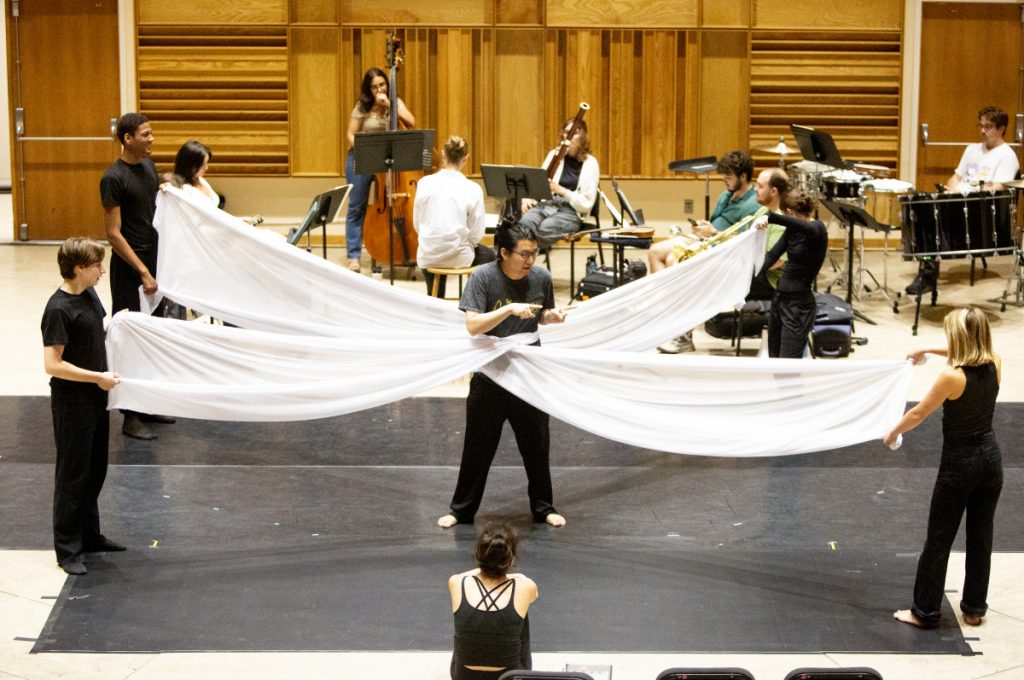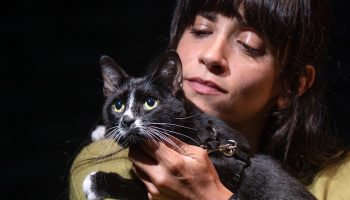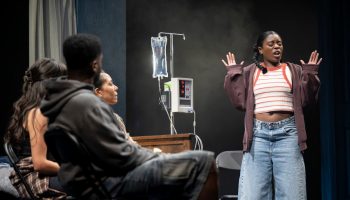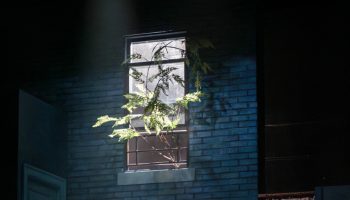
Gabriel Weber
Staff Writer
Presenting a tale as old as time, artists from the School of Dance, Chautauqua Theater Company and Music School Festival Orchestra enact the Faustian pact of Igor Stravinsky’s L’Histoire du Soldat — or Tale of the Soldier — at 4:15 p.m. Saturday in Elizabeth S. Lenna Hall.
There will be seven total musicians — one violin, clarinet, bass, bassoon, trumpet, trombone and percussionist — four CTC conservatory actors and three dancers from the dance department.
School of Dance guest faculty Joseph Jeffries — who is also assistant director of the Northeast School of Ballet Conservatory — choreographed, while CTC FutureNow Stage Directing Fellow Yojiro Ichikawa serves as acting director and 2025 David Effron Conducting Fellow Hannah Schendel takes the baton as maestro.
The tale is a 60-minute production depicting a soldier who trades his violin to the devil for a book that can see the future, resulting in wealth but, ultimately, unhappiness. Out of necessity, Stravinsky wrote it as a traveling theater piece to avoid destitution toward the end of World War I, inspired by legends of soldiers who deserted and had their souls carried off.
Some of Stravinsky’s widely known pieces, like Rite of Spring and The Firebird were written earlier; there’s a shift from a more dense feeling in his compositions, to L’Histoire du Soldat’s transparency, Schendel said. The score also features a great deal of shifting time signatures, meaning the beat is constantly changing.
“Stravinsky in general is typically very complex music because it’s more rhythmically based. There’s a rhythmic drive, and sometimes the pulse suddenly shifts, which makes it really difficult because the stronger pulses land in places that you don’t anticipate. It’s hard in terms, especially, I think, for the musicians in terms of counting,” Schendel said. “I like to think of it as he came up with this one idea, took scissors, cut in 10 pieces and then put those pieces of paper in any order that he felt like. So it doesn’t quite make sense.”
Though it might not entirely make sense on paper, L’Histoire du Soldat does closely follow its narrative. During pre-production, Ichikawa integrated the acting and music sections for a more cohesive story.
“I wondered, what is the best way to tell this story for the modern audience? What I did was integrate these two split sections together so that the music is now underscoring many of the scenes, so that we can see that these two things are together,” Ichikawa said.
While the MSFO and School of Dance get to collaborate several times a season, it is more rare to have the addition of the conservatory actors. Ichikawa finds one of the biggest challenges to be scheduling, as the three different departments have extremely full calendars and had to fight to fit in the four rehearsals.
“It is a challenging thing and at the same time exciting that I have to merge these totally different things together in a limited amount of time. I take it as an adventure, in a way, because the dancing scenes are choreographed using Joseph’s creativity, and then obviously music is conducted by our wonderful conductor Hannah,” Ichikawa said. “This means two perspectives are already there for me, and then what I’m doing is trying to find a way to connect these things together.”
Ichikawa, whose work until recently was mostly in musical theater, relishes the blend of all three collaborations.
“The merging of music, art and acting is really important,” Ichikawa said. “Putting these three things together is always a big, big element in my directing style. So when I heard that this project is happening, I felt like this is perfect
for me.”
While Schendel has conducted several pieces over the course of her residency at Chautauqua, this is the longest work she’ll be in charge of this summer.
“It’s fun as the conductor to see and also facilitate the evolution of the piece,” Schendel said. “The musicians came in very well-prepared, but there’s always small things to tweak, like who to listen to at this moment. Since it’s a small ensemble, there’s more of an opportunity for us to have a dialogue about some things, rather than a normal orchestra rehearsal where it’s usually the conductor speaking and telling them what to do.”
Though Stravinsky once said that music was incapable of expressing true emotion, he contradicted himself in later saying that music expresses itself.
“It’s kind of a commentary on reminding us to appreciate the things that we do have and not to covet more than what we can take on or more than we have at the moment,” Schendel said. “What’s interesting is that I think any person can listen to this piece and then come to their own conclusions about the emotional expression.”
Creativity from all individuals involved is integral to the production, as the audience gets to visualize a space bigger than what lies before them, and the actors fabricate something bigger than themselves.
“Imagination is really important in theater because, physically, the size of the space is really limited,” Ichikawa said. “That is a representation of how limitless human beings’ creativity can go. I always try to create space that is free for all the artists involved in the space to put their creativity into the piece, so by collaborating, we can create something that is beyond one person’s imagination.”
In relating to the tale, the audience may leave the performance feeling blessed to be in Chautauqua at this moment.
“The moral of the story is literally timeless. It’s a good reminder for all of us to be in the moment,” Schendel said. “Enjoy the present, and have gratitude.”




